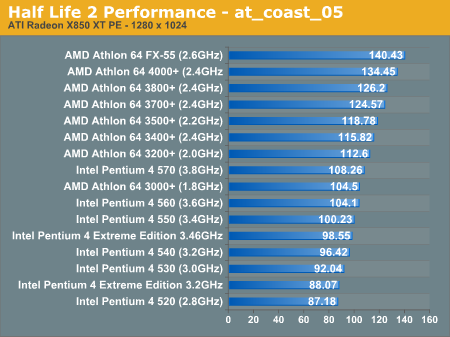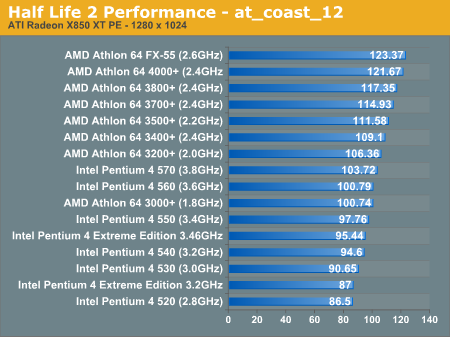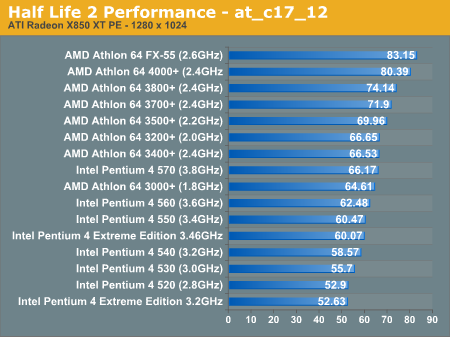AMD vs. Intel Performance
At this point it's not too big of a surprise that AMD is the stronger performer when it comes to gaming performance. It's actually at the point where even insiders at Intel will admit and recognize that Intel is no longer the king of gaming performance as they once were long ago. But how bad is it under Half Life 2? Let's take a look at our five custom demos to find out.
We used the current king of Half Life 2 performance for all of our CPU tests - the ATI Radeon X850 XT Platinum Edition running at 1280 x 1024, to give a good balance between CPU and GPU limitations while providing realistic performance figures. Note that all of the Intel CPUs tested here are LGA-775 and all of the AMD CPUs are Socket-939.
First we have at_canals_08, generally a good GPU test, meaning that its CPU dependency is minimized. The benchmark includes a decent number of NPCs and firefights but is severely offset by things like water and flashlight usage, both of which are more GPU intensive elements of the benchmark.

Things don't look so good for Intel here, the Pentium 4 570J is the only Intel CPU capable of outperforming the Athlon 64 3000+. Unfortunately for Intel, AMD's Athlon 64 4000+ is about 14% faster at 1280 x 1024.
The Extreme Edition CPUs don't do much for Intel, as Prescott does appear to perform equal or better clock for clock than the older Northwood core.
Next let's take a look at at_coast_05, another very GPU limited test that has a good deal of NPC interaction as well as GPU limiting elements:

The results here are very similar to what we saw under at_canals_08, with the Pentium 4 570J offering performance slightly higher than the Athlon 64 3000+ but that's about it for Intel. The Athlon 64 4000+ is an impressive 24% faster than Intel here which honestly is nothing to scoff at.
Our next demo, at_coast_12, doesn't change much either:

The performance under at_prison_05 is a little closer:

Finally we have an excellent CPU benchmark, at_c17_12. The test is extremely CPU bound, and thus makes the perfect conclusion to this section:

While you can argue that AMD's performance advantages in the other tests aren't noticeable on a price-for-price basis, you can't argue with the results here. At the $280 - $290 price point, AMD's Athlon 64 3500+ delivers about 15% more performance than Intel's Pentium 4 550.
The margin is even greater at the low end, AMD's Athlon 64 3000+ is 23% faster than Intel's similarly priced Pentium 4 520.
At the high end the advantage is equally in AMD's favor, with the Athlon 64 4000+ holding a 22% advantage over Intel's fastest Pentium 4.
Conclusion? Don't look any further than AMD for the best gaming CPU, and Half Life 2 further cements AMD's reputation as the gamer's CPU.










68 Comments
View All Comments
Phantronius - Wednesday, January 26, 2005 - link
If your gaming on a laptop, you need help.RockHydra11 - Wednesday, January 26, 2005 - link
Was anyone surprised by the results, or didn't know what the answer would be already? I could make a very educated guess before I even clicked on the link.T8000 - Wednesday, January 26, 2005 - link
This kind of CPU reviewing really makes me wonder if anyone plays with a $700 R850 XT-PE without anti-aliasing, anistrophic filtering and does so at 1280x1024.I mean, if that's all you want, why not save a cool $500 and buy a GF6600GT instead.
It would be nice if someone reviewed CPU scaling at real gaming settings, because the 20% differences created here, may translate in only 5% with real settings, making it unnoticable during gameplay.
Whiskyboy - Wednesday, January 26, 2005 - link
I thought the artilce was a nice return to the feature for feature comparison that a shopper like myself really finds useful. I'm slighlty curious about upcoming technologies but I'm really disintereted in seeing how the brand new toy from AMD or Nvidia performs because I'm not going to suggest paying the ridiculous premiums they charge for the new junk. Seeing the effect that things like memory timings, bandwidth, cpu clock have on performance in a consistent platform make it easier for me to make recommendations to my customers for their systems. I like the Buyer's Guide articles, but in all honesty I want the charts that this article has. If you are suggesting that there should be more articles like this, I agree, but I'm not about to complain about the first article in months that actually made a useful shopper's comparison. Thanks AnandMarlowe - Wednesday, January 26, 2005 - link
I would like to see the cpu scaling done with Intel cpu's too! :)Cybercat - Wednesday, January 26, 2005 - link
The X850XT PE being a PCIe part, how did you use it on Socket 754 CPUs? I've not seen any Socket 754 NF4 boards yet.Aquila76 - Wednesday, January 26, 2005 - link
#32 - Gamers buy PC's in orders of magnitude greater numbers than laptops. Maybe you can run Half-life 2 on your Intel Extreme Graphics, but that's nothing compared to gaming on an A64 with a decent video card and sound.jherber - Wednesday, January 26, 2005 - link
where is the pentium m? MOST OF US BUY LAPTOPS THESE DAYS.REMF - Wednesday, January 26, 2005 - link
roflmao:http://images.anandtech.com/graphs/half%20life%202...
an Athlon64 3200+ @ 2.0GHz gets 112fps
an Athlon64 3000+ @ 1.8GHz gets 104fps
.'. an A64 3100+ @ 1.9GHz would get 108fps
...... the same as a P4 570 running at 3.8GHz, twice the speed!
LOL
bupkus - Wednesday, January 26, 2005 - link
I'm glad to finally see this article. I've been waiting for weeks and beginning to think this article was just "vaporware". ;)As to the following quote:
"If you are stuck with one of those older but still well-performing GPUs, don't bother upgrading your CPU unless it's something slower than a 2.4GHz Pentium 4 - you'd be much better served by waiting and upgrading to dual core later on."
As this was just a tantalizing morsel of things to come, I'm looking forward to the coming weeks.